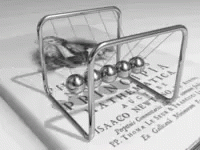General Physics: Supplementary Notes¶
These notes supplement the General Physics introductory course sequence at Chapman University. The sequence is designed to roughly follow the texts of the Six Ideas That Shaped Physics series by Professor Thomas A. Moore at Pomona College, with integration of supplementary content throughout. Where appropriate, references to these texts will be provided in the notes to provide further context, reading, and exercises.
The course sequence and its chosen texts construct a modern foundation for introductory physics. This approach emphasizes core modeling concepts that seamlessly generalize to advanced topics and methods. Unlike sequences that relegate the “modern physics” of the past century to a special topics afterthought, this sequence integrates a modern perspective throughout the curriculum from the beginning. Having consistent foundational concepts helps prevent students from learning more limited and outdated concepts as fundamental only to have to unlearn them later.
The modern approach adopted in the sequence leverages insights gained from active research in the foundations of physics by the Institute for Quantum Studies at Chapman University. The foundational emphases have also been refocused to more directly highlight the deep connections between well-developed modeling methods in physics and similar topics that have become common in machine learning and data science disciplines. Similarly, examples have been tuned so that the broad applicability of physics concepts to chemistry, materials science, computer engineering, and electrical engineering are manifest.
Sequence Topic Outline:
PHYS 101: General Physics I
Six Ideas: Unit C (Conservation Laws)
Six Ideas: Unit N (Newton’s Laws)
Six Ideas: Unit R (Relativity - some)
Supplement: Concept Map, Structure of Matter, Error Propagation, Action Principle
PHYS 102: General Physics II
Six Ideas: Unit E (Electromagnetism)
Six Ideas: Unit R (Relativity - more)
Supplement: Relativistic EM Methods
PHYS 201: General Physics III
Six Ideas: Unit T (Thermodynamics)
Six Ideas: Unit Q (Quantum Mechanics)
Six Ideas: Unit R (Relativity - all)
Supplement: Optics, Fluids, Quantum Bits
Hopefully you find these notes useful in your studies.
Justin Dressel, Ph.D.
Program Director of Physics
Associate Professor of Physics
Institute for Quantum Studies
Chapman University
Email:dressel -at- chapman.edu
Website: http://www.justindressel.com
